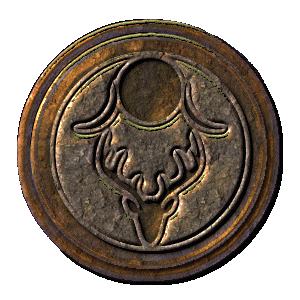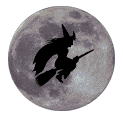|
|
 |
|

|
 |
|
The Goddess and the God
There are many different terms to describe what people believe regarding the divine.
Monotheism (Christianity) is the belief in a single god with no other gods being accepted as 'valid.'
Henotheism (Gnosticism) is the worship of a single deity without denying the existence of other deities.
Pantheism (Hinduism) is the view that God and the Universe are one and the same, therefore, everything
in the Universe is a part of God. In this case, all deities are actually aspects of the same god. Polytheism (Ancient
Roman and Greek) is the belief in many separate Gods, all equally valid and with distinct characteristics. There
are many other "-theisms" but these are the most acknowledged forms of religious belief and will be quite sufficient to the
discussion of Wiccan deity concepts.
Without a doubt, Wicca is not a monotheistic religion. Religious tolerance is
one of the basic tenets of Wiccan belief and is explained in more detail later in the "Philosophy" section. In the book "Solitary
Wicca for Life: A Complete Guide to Mastering the Craft on Your Own", author Arin Murphy-Hiscock says:
“[Another] term, and one that deserves serious consideration among Wiccans,
is henotheism. This is the belief in one god without denying the existence of others. Henotheism recognizes that the
deities with whom Wiccans work are valid without discounting any other godforms. It is inclusive, rather than exclusive.”
It is my understanding, that henotheism refers to the worship of a single deity,
or to a single pantheon of deities, to the exclusion of all others. Henotheistic religions don’t deny the existence
of other deities or pantheons, however, they only worship one. In most Wiccan traditions, there are deities from multiple
pantheons worshipped depending on the circumstances. For instance, in the Gardnerian Book of Shadows, Cernunnos, a Celtic
God, is recognized as the main male representative of deity while Aradia, an Italian Goddess, is the main female representative.
As most Wiccans use deities from many pantheons in their practice, I would hesitate to apply this term to Wicca.
So,
what does all this mean in plain English? Personally, I ascribe to the pantheistic view in my practice. I believe that everything
in the Universe, the Universe itself even, is part of the Divine. In my view, the Divine didn’t create the Universe
and then step back to watch what happened, the Divine is the Universe. Any Goddesses or Gods that I call upon in my
practice are representative of certain aspects of the Divine.
Many other Wiccans are staunchly in the polytheistic
category. They believe that there is a creator god and many other representatives of divine power that are entities unto themselves.
To try and say one view or the other is more prevalent would be beyond my experience with other practitioners of Wicca. I
would suspect, however, that both views are widely represented.
That Wiccans can have different views of the Goddess
and God but still be part of the same religion is one of the many reasons that Wicca is so hard to define.
|
 |
|
|
 |
|
|
 |
|
|
|
|
PLEASE NOTE: All graphics and written materials on this site are copyright © protected by myself or someone else. Unless
otherwise noted, all written material on this site is my original material. Material that was not created by me is credited
to its author. Graphics are credited to and obtained from the sites of the artists who created them, as far as I know. Please
do not copy anything from this site, either written or graphic. Visit the creators' sites, buy or borrow their books, or visit
'research' sites and download directly from there. Always include credit and copyright info. To copy or reprint any of my
original information, please contact me for permission.
Witchmoon - © Unknown: I lost the credit info
for this one in a computer crash.
Help finding its owner would be appreciated.
|
|
|
 |

